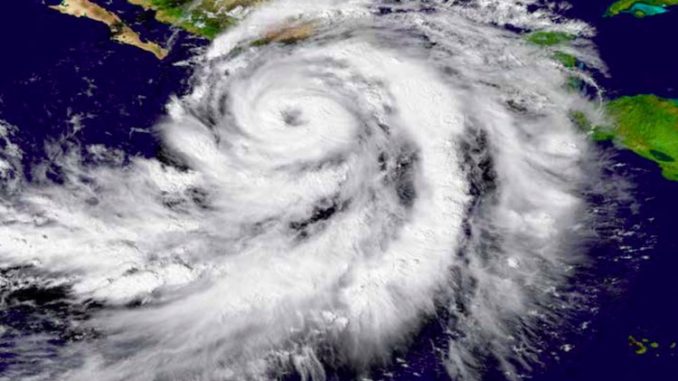
Dr J. Scott Hauger, professor at the Daniel K. Inouye Asia Pacific Center for Security Studies, Hawaii, writes that there are several actions that security sector leaders must take in order to manage climate change.
Global warming is a fact. According to data presented by the US National Aeronautics and Space Administration (NASA), the average surface temperature of the Earth has increased by more than 1 degree Celsius over the last hundred years, and it continues to rise at an increasing rate.
The phenomenon has been recognised by the scientific community for more than 50 years. Since 1988, the Intergovernmental Panel on Climate Change (IPCC) has synthesised and disseminated scientific research on climate change including its likely impacts on the natural and built environment. It is these projected impacts that comprise the threat of climate change to human and national security.
Why is Climate Change a Security Problem?
Simply put, higher ocean temperatures result in more evaporation and thus in increased precipitation and flooding, globally. Warmer waters provide more energy to tropical storms and also result in the thermal expansion of seawater and consequent sea-level rise.
At the same time, higher air temperatures promote the melting of ice and snow, impacting agricultural hydrology in snow-fed river systems and reducing sea ice and degrading the polar ice caps. They promote extreme weather events such as droughts, tornadoes, and forest fires. Together with higher ground temperatures, warmer air also contributes to desertification in drylands and permafrost melting in cold regions.
Atmospheric scientists broadly agree that the principal cause of the rapid, contemporary global warming is the increasing concentration of carbon dioxide (CO2) in the air. The principal source of CO2is from the burning of fossil fuels — the oxidation product of carbon and carbohydrates, exhausted into the atmosphere.
As a greenhouse gas, CO2inhibits the re-radiation of thermal energy from the surface of the Earth back into space, changing the heat balance of our planet. The increased amount of CO2in the air also crosses the air/water boundary, dissolving in water to form carbonic acid.
Thus, according to the U.S. National Oceanic and Atmospheric Administration (NOAA), the acidity of the Earth’s oceans has increased by about 30 percent since the beginning of the Industrial Revolution. Ocean acidification threatens sea life that depends on carbonate ions for their structure, with consequences throughout the marine food chain. Coral reefs are notably vulnerable to the combined impacts of acidification and warming.
These primary climate effects, which are expected to increase as long as atmospheric CO2levels continue to increase, have important consequences for the natural and built environment. These include local decreases in fresh water availability, impacts on food production, damage to infrastructure from floods and storms, inundation of low-lying plains, salt water intrusion into aquifers, and the spread of disease vectors to more northern/southern regions and to higher elevations.
Events such as these cause people to migrate, seeking to relocate to a more secure location.
Environmental degradation and disasters comprise a threat to governance, especially in weak or failing states, and thus to national and regional security. They create or exacerbate the potential for conflict over resources, over migration, and over blame for causing the problem.
Sherry Goodman, Deputy Undersecretary of Defense for Environmental Security under Bill Clinton, famously described climate change as a “threat multiplier,” a label that has become common currency in the security sector.
What Is the Climate Change Impact in the Indo-Pacific?
In Oceania, the major impacts of climate change on security are anticipated to be the combination of rising sea levels threatening coastal agriculture and infrastructure, combined with ocean warming and acidification and their impact on coral reefs.
These threats to food security and economic viability, and the possibility of total inundation pose an existential threat to atoll island nations, whose populations may have to relocate elsewhere. Coastal regions of New Zealand, Australia, and the fertile deltas of mainland Asian rivers are at similar risk.
Depending upon the rate of global warming, these phenomena will increasingly impact the region throughout the 21stcentury and beyond.
Enjoying this article? Consider a subscription to the print edition of Line of Defence Magazine.
East Antarctica is currently stable, as increased precipitation and new ice formation outpace melting, but according to the British Antarctic Survey, the western Antarctic Peninsula is warming and ice shelves thinning. Moreover, the Circumpolar Current is warming more rapidly than the ocean as a whole – with negative impacts on the abundance of krill and thus on the whole Antarctic food chain.
As the resource-rich continent becomes more accessible and as global population growth and economic development necessitate increasing resource extraction, competition for fisheries may increase and the Antarctic Treaty System’s mining ban may be challenged. New Zealand’s heritage territorial claim to the lands bordering the Ross Sea could become a tempting target for those hoping to exploit the continent’s resources.
The potential impacts of climate change on Antarctica and its governance are long-term. The current mining ban may be legally reviewed after 2048, perhaps a milestone for reconsidering Antarctic governance and security.
What Can We Do about It?
What can the security sector do to respond to and minimize the threat of climate change? We may state at the outset that climate change is a complex problem requiring a whole-of-government, indeed a whole-of-society, approach to manage the threat.
There are four areas for action: mitigation, adaptation, response, and knowledge creation and dissemination. The security sector must participate in all these areas and play a leading role in both response and knowledge creation.
The motive for the security sector is this: to the extent that governance is unable to affect mitigation and adaptation, leading to the disastrous impacts outlined above, it is the security sector that will have to deal with the consequences of conflict.
Mitigation means reducing or minimising the load of greenhouse gases in the atmosphere and thus reducing global warming. The greatest opportunities for mitigation lie in the energy, transportation, and agriculture sectors. The security sector can provide technology demonstration and innovation and demonstrate moral authority by leadership in its own use of energy, transportation, and land use.
Adaptation means planning and action to minimise the negative impacts of anticipated warming. Even the best-case scenario reflecting the 2015 Paris Accord to the United Nations Framework Convention on Climate Change is projected to result in a rise of more than 2.5 degrees Celsius above pre-industrial levels, an additional rise of perhaps 1.5 degrees.
To the extent that mitigation efforts fail, the temperature rise will be higher. Thus, sea levels will continue to rise, and extreme weather events will increase. Adaptation will require the strengthening of coastal and riparian infrastructure, moving certain parts of the population uphill or inland and securing fresh water and food supplies for a growing global population.
Low-lying island states especially will require technical and financial assistance to address adaptation needs.
Disaster response is a traditional responsibility of the security sector. Current projections indicate that natural disasters due to storms, floods, drought and other weather-related events will increase to the extent that mitigation and adaptation fail. Security forces throughout the Indo-Pacific region can expect their humanitarian assistance and disaster relief missions to expand.
Border control in the face of human migration is also likely to increase in importance, as is maritime security and the protection of fisheries. New Zealand must consider the future need to provide sanctuary to Pacific Islanders whose homes have become uninhabitable.
The time to plan for these events is now. Moreover, an expected increase in the scale and density of climate-related disasters imply that effective response will require institution building to support greater preparation and collaboration by security forces across the region to manage effective response to the increasing threat.
Finally, there is a need for better knowledge of the threat – actionable knowledge to support security sector planning, and public knowledge so that citizens can support the security sector as it seeks to meet this emerging, non-traditional threat.
Most of what we know, or think we know, about climate change is the result of academic research into complex phenomena. Research questions are typically set or influenced by funding agencies.
In the areas of atmospheric science, earth science, and environmental science most of the funding comes from basic research agencies. Unlike weapons-related research or command and control-related topics such as cyber-security, the security sector does not generally fund research related to climate change and its impacts.
As a consequence, answers to security issues must be derived from data sets developed to answer related, but different questions. There is a need for the security sector to sponsor and fund competitive research initiatives to provide actionable knowledge to support mitigation, adaptation and response by security agencies.
Conclusion
In summary, our planet continues to experience global warming, primarily due to increasing carbon dioxide in the atmosphere. Higher temperatures will result in rising sea levels and more extreme weather events which in turn threaten food security, fresh water resources and coastal infrastructure.
Environmental degradation and disasters comprise a threat to governance, and thus to national and regional security. Pacific Island nations are especially vulnerable. In the longer term, competition for Antarctic resources may impact New Zealand’s stake in the southern continent.
The security sector has a major stake in the course of climate change because we will be called upon to respond to its impacts to the extent that global and national efforts at mitigation and adaptation fall short.
To manage the threat, security sector leaders must support and encourage global collaboration to mitigate greenhouse gas emissions. They must provide technical expertise and financial support to harden infrastructure and otherwise adapt to the inevitable impacts of further warming both at home and in assistance to developing nations.
In addition to preparing for a greater number of more extensive humanitarian assistance and disaster relief missions, they should sponsor research and development to create actionable knowledge to support these activities, and they should work to educate the public about the nature and implications of climate change.









